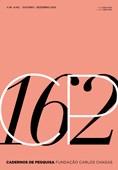Aesthetic Education, cinema and otherness
Keywords:
Cinema, Culture, Ethics, Aesthetic Education.Abstract
In this paper we discuss the relationships between education and otherness based on a survey carried out with foreign students invited to discuss Brazilian films in a classroom situation. Based on thinkers such as Alain Badiou, Carlos Skliar and Julia Kristeva, we describe the ways in which narratives mobilized young people around the complex issue of the “vision of the foreigner” and its relevance for education. We discuss the expectations of the foreign student regarding a culture different from theirs, when in contact with audiovisual narratives produced in Brazil. The conclusions bring new issues based on the work with the students, which focus on the theme of ethical and aesthetic education, raised by the experience with the film and with otherness.Downloads
References
BADIOU, Alain. El cine como experimentación filosófica. In: YOEL, Gerardo (Comp.). Pensar el cine 1. Imagen, ética y filosofia. Buenos Aires: Manantial, 2004. p. 23-81.
BADIOU, Alain. Os falsos movimentos do cinema. In: BADIOU, Alain. Pequeno manual de inestética. São Paulo: Estação Liberdade, 2002. p. 103-115.
CARANDIRU. Direção; Produção: Héctor Babenco. São Paulo: Columbia Pictures do Brasil; HB Filmes, 2003.
CIDADE de Deus. Direção: Fernando Meirelles. Produção: Andrea Barata Ribeiro e Maurício Andrade Ramos. Rio de Janeiro: O2 Filmes e Globo Filmes, 2002.
DIDI-HUBERMAN, Georges. O que vemos, o que nos olha. São Paulo: 34, 2010.
DURVAL Discos. Direção: Anna Muylaert. Produção: Sara Silveira. São Paulo: Europa Filmes, 2002.
HELENO. Direção: José Henrique Fonseca. Produção: Eduardo Pop e Rodrigo Teixeira. Rio de Janeiro: Goritzia Filmes, 2012.
KRISTEVA, Julia. Estrangeiros para nós mesmos. Rio de Janeiro: Rocco, 1994.
LISPECTOR, Clarice. Para não esquecer. Rio de Janeiro: Rocco, 1999.
MARCELLO, Fabiana de Amorim. Criança e imagem no olhar sem corpo do cinema. 2008. 237 f. Tese (Doutorado em Educação) – Universidade Federal do Rio Grande do Sul, Porto Alegre, 2008.
O CASAMENTO de Romeu e Julieta. Direção: Bruno Barreto. Produção: Paula Barreto. Califórnia: Miravista, 2005.
O HOMEM que copiava. Direção: Jorge Furtado. Produção: Nora Goulart e Luciana Tomasi. Porto Alegre: Casa de Cinema de Porto Alegre, 2003.
O INVASOR. Direção: Beto Brant. Produção: Bianca Villar e Renato Ciasca. São Paulo: Drama Filmes, 2002.
SKLIAR, Carlos. Pedagogia (improvável) da diferença: e se o outro não estivesse aí? Rio de Janeiro: DP&A, 2003.
SKLIAR, Carlos. Hablar con desconocidos. Barcelona: Candaya, 2014.
TROPA de elite. Direção: José Padilha. Produção: José Padilha e Marcos Prado. Rio de Janeiro: Zazen Produções, 2007.
Downloads
Published
How to Cite
Issue
Section
License
Copyright (c) 2016 Cadernos de Pesquisa

This work is licensed under a Creative Commons Attribution-NonCommercial 4.0 International License.
Authors who publish in this journal agree to the following terms:
a. Authors retain the copyright and grant the journal the right to first publication, with the paper simultaneously licensed under the Creative Commons Attribution license that allows the sharing of the paper with acknowledgment of authorship and initial publication in this journal.
b. Authors are authorized to assume additional contracts separately, for non-exclusive distribution of the version of the paper published in this journal (for example publishing in institutional repository or as a book chapter), with acknowledgment of authorship and initial publication in this journal.
c. Authors are allowed and encouraged to publish and distribute their paper on-line (for example in institutional repositories or on their personal page) at any moment before or during the editorial process, as this can generate productive changes, as well as increase the impact and citation of the published paper (See The Effect of Open Access).









